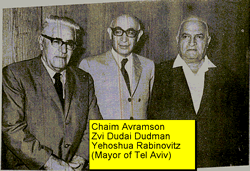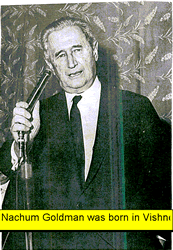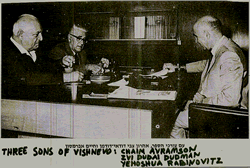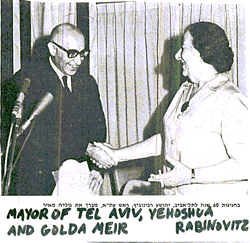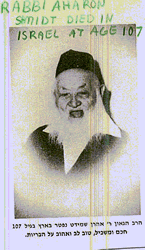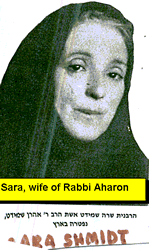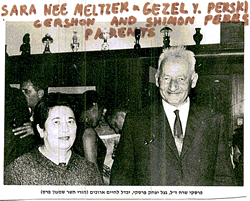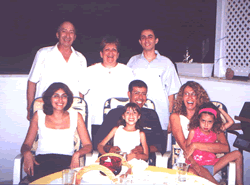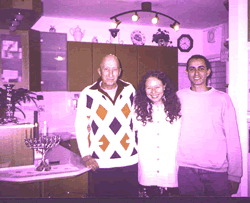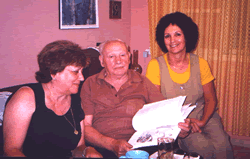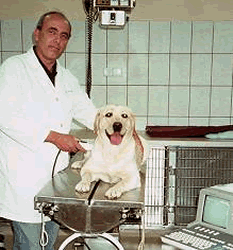click
to enlarge
Vishnevans
In Israel
#vi-1
#vi-2
#vi-3
#vi-4
#vi-5
#vi-6
#vi-7
#vi-8
#vi-8
#vi-9
#vi-10:Yoni
Peres, middle son of Shimon and Sonia born in 1952
himon Peres is married to Sonya (nee Gelman); they have two sons and a daughter - and six grandchildren. a daughter, Zikki, and two sons, Yoni and
Veterinarian Yonatan Peres, the son of Shimon Peres, recently related to HERITAGE the story of how his family took the name "Peres."
In 1945, he said, his father was directed by David Ben-Gurion, who then was chairman of the Jewish Agency, and Palmach founder Itzhak Sadeh to lead a 12-member expedition to map the Negev. With 12 camels, the group spent 22 days trekking along the Arava valley from Be'er Afloug to Oum Rashrash, which was the forerunner settlement of Eilat.
The 12 trekkers included members of the Palmach, the Noar Odev youth movement, and several scientists, including a botanist, zoologist and an archeologist.
"All of a sudden my father -- who then was named Shimon Persky-- saw a nest on the tree," Dr. Peres told HERITAGE. "He thought it was a vulture's or an eagle's. He climbed on the tree and found the nestlings inside.Dr. Yonatan Peres (above) bids goodbye to the
peres, Shimon, named for his father (below)
Then Prof. Heinrich Mendelson, who was a walking encyclopaedia and later became head of the zoology department at Tel Aviv University, said 'yes, you have just discovered a nest of peres.' "And the rest of them said 'Persky is not a Hebrew name; so now you can take the Hebrew name Peres and this is the real story of how Persky became Peres."
Besides being related to the bird's namesake, Yonatan Peres is quite interested in the program because he is a veterinarian and a close friend of Dr. Igal Horowitz, the Tel Aviv-Ramat Gan Zoological Center veterinarian who got Shimon the peres ready for his trip to San Diego.
ILOS ANGELES -- Being the son of Israeli Foreign Minister Shimon Peres is a mixed blessing. "The name helps open some doors," says Dr. Yonatan "Yoni" Peres, "but sometimes it closes them." The doors through which the younger Peres, a veterinarian, hopes to pass lead to potential supporters of his pet project, the Israel Guide Dog Center for the Blind. With Los Angeles as his base, Peres is spending some months in the United States as the center's volunteer development director. It's an assignment that necessitates his competing with better-known Israeli causes and institutions for the contributions of charitable American Jews. Although the center also has support organizations in Britain, Switzerland and Israel, American donations account for 80 percent of its annual $630,000 budget. There are some 20,000 blind persons in Israel, among them 150 veterans blinded through combat wounds. Some names have been added to the list more recently as victims of terrorist attacks. The acceptance of guide dogs, as well as pets in general, is not as common in Israel as in the United States, says Peres. According to his statistics, there is one pet dog or cat for every two Americans, while in Israel the ratio is one such pet to every 20 people. He attributes the difference to the higher living standards of Americans, with their larger homes and backyards, as well as an Israeli mentality that associates dogs with pogroms and Nazi concentration camps. Peres was a member of Hebrew University's first graduating class in veterinary medicine, but he traces his love of animals back to his childhood. "That's something you are born with, you don't acquire it," he says. Though not claiming any genetic family inheritance, Peres notes that his father, after arriving in Palestine from Poland, worked on a kibbutz looking after cows and sheep. The middle child of three, Yoni Peres remembers a difficult childhood as the son of a famous father. "You were always under the microscope," he recalls. "When you did something well, people thought you used your family connections. When you did something bad, it was a public disgrace." He has found in the United States a greater appreciation of his father's talents and contributions than in Israel, but he quickly turns the conversation back to the present. "I want to live as a normal person, not as the son of a famous man,'' says Peres, who recently turned 50 and is divorced. Up until a decade ago, a blind Israeli waiting to acquire a guide dog had to travel to the United States for training, a move that required money, separation from family and fluency in English. In 1991, Noach Braun, who had worked with dogs during his Israeli army service and subsequently trained in the United States and Britain, opened the guide dog center and three years later moved it to its present location in Beit Oved, south of Tel Aviv. Its Web site is www.Israelguidedog.orgThe facilities were, and still are, spartan by American standards. Braun and his wife, Orna, acquired two breeding dogs and four mobile homes -- two for offices and two to house four blind people during their training period. Peres, then in private practice and teaching at Hebrew University, joined the center as a volunteer shortly after its opening. He is largely responsible for the medical screening and evaluation of potential guide dogs.So far, 100 Israelis have graduated from the center, and a building program is underway to accommodate many more.
himon Peres is married to Sonya (nee Gelman); they have two sons and a daughter - and six grandchildren. a daughter, Zikki, and two sons, Yoni and
Veterinarian Yonatan Peres, the son of Shimon Peres, recently related to HERITAGE the story of how his family took the name "Peres."
In 1945, he said, his father was directed by David Ben-Gurion, who then was chairman of the Jewish Agency, and Palmach founder Itzhak Sadeh to lead a 12-member expedition to map the Negev. With 12 camels, the group spent 22 days trekking along the Arava valley from Be'er Afloug to Oum Rashrash, which was the forerunner settlement of Eilat.
The 12 trekkers included members of the Palmach, the Noar Odev youth movement, and several scientists, including a botanist, zoologist and an archeologist.
"All of a sudden my father -- who then was named Shimon Persky-- saw a nest on the tree," Dr. Peres told HERITAGE. "He thought it was a vulture's or an eagle's. He climbed on the tree and found the nestlings inside.Dr. Yonatan Peres (above) bids goodbye to the
peres, Shimon, named for his father (below)
Then Prof. Heinrich Mendelson, who was a walking encyclopaedia and later became head of the zoology department at Tel Aviv University, said 'yes, you have just discovered a nest of peres.' "And the rest of them said 'Persky is not a Hebrew name; so now you can take the Hebrew name Peres and this is the real story of how Persky became Peres."
Besides being related to the bird's namesake, Yonatan Peres is quite interested in the program because he is a veterinarian and a close friend of Dr. Igal Horowitz, the Tel Aviv-Ramat Gan Zoological Center veterinarian who got Shimon the peres ready for his trip to San Diego.
ILOS ANGELES -- Being the son of Israeli Foreign Minister Shimon Peres is a mixed blessing. "The name helps open some doors," says Dr. Yonatan "Yoni" Peres, "but sometimes it closes them." The doors through which the younger Peres, a veterinarian, hopes to pass lead to potential supporters of his pet project, the Israel Guide Dog Center for the Blind. With Los Angeles as his base, Peres is spending some months in the United States as the center's volunteer development director. It's an assignment that necessitates his competing with better-known Israeli causes and institutions for the contributions of charitable American Jews. Although the center also has support organizations in Britain, Switzerland and Israel, American donations account for 80 percent of its annual $630,000 budget. There are some 20,000 blind persons in Israel, among them 150 veterans blinded through combat wounds. Some names have been added to the list more recently as victims of terrorist attacks. The acceptance of guide dogs, as well as pets in general, is not as common in Israel as in the United States, says Peres. According to his statistics, there is one pet dog or cat for every two Americans, while in Israel the ratio is one such pet to every 20 people. He attributes the difference to the higher living standards of Americans, with their larger homes and backyards, as well as an Israeli mentality that associates dogs with pogroms and Nazi concentration camps. Peres was a member of Hebrew University's first graduating class in veterinary medicine, but he traces his love of animals back to his childhood. "That's something you are born with, you don't acquire it," he says. Though not claiming any genetic family inheritance, Peres notes that his father, after arriving in Palestine from Poland, worked on a kibbutz looking after cows and sheep. The middle child of three, Yoni Peres remembers a difficult childhood as the son of a famous father. "You were always under the microscope," he recalls. "When you did something well, people thought you used your family connections. When you did something bad, it was a public disgrace." He has found in the United States a greater appreciation of his father's talents and contributions than in Israel, but he quickly turns the conversation back to the present. "I want to live as a normal person, not as the son of a famous man,'' says Peres, who recently turned 50 and is divorced. Up until a decade ago, a blind Israeli waiting to acquire a guide dog had to travel to the United States for training, a move that required money, separation from family and fluency in English. In 1991, Noach Braun, who had worked with dogs during his Israeli army service and subsequently trained in the United States and Britain, opened the guide dog center and three years later moved it to its present location in Beit Oved, south of Tel Aviv. Its Web site is www.Israelguidedog.orgThe facilities were, and still are, spartan by American standards. Braun and his wife, Orna, acquired two breeding dogs and four mobile homes -- two for offices and two to house four blind people during their training period. Peres, then in private practice and teaching at Hebrew University, joined the center as a volunteer shortly after its opening. He is largely responsible for the medical screening and evaluation of potential guide dogs.So far, 100 Israelis have graduated from the center, and a building program is underway to accommodate many more.
#vi-11
#vi-12
#vi-13
